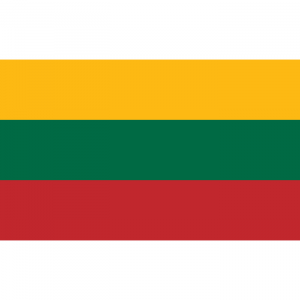Language/Lithuanian/Vocabulary/Friendship-and-Social-Life
Introduction[edit | edit source]
Welcome to the lesson on Friendship and Social Life in Lithuanian! In this lesson, we will learn the vocabulary and phrases that will help you make friends and socialize in Lithuanian. Building relationships and connecting with others is an essential part of any language learning journey, and by the end of this lesson, you will be equipped with the necessary tools to start forming connections with Lithuanian speakers. So, let's get started!
Vocabulary[edit | edit source]
Greetings[edit | edit source]
When meeting someone new, it's important to know how to greet them in Lithuanian. Here are some common greetings:
- Labas - Hello
- Sveiki - Hi
- Labas rytas - Good morning
- Laba diena - Good day
- Labas vakaras - Good evening
Introductions[edit | edit source]
Once you've exchanged greetings, it's time to introduce yourself. Here are some phrases to help you with introductions:
- Aš esu [Your Name] - I am [Your Name]
- Malonu susipažinti - Nice to meet you
- Kokia jūsų profesija? - What is your profession?
- Kiek jums metų? - How old are you?
Making Friends[edit | edit source]
Now that you know how to greet someone and introduce yourself, let's learn some phrases for making friends:
- Ar norėtumėte būti mano draugas? - Would you like to be my friend?
- Ar galėtume susitikti kartu? - Can we hang out together?
- Man patinka tavo kompanija - I enjoy your company
- Ar turite laiko šį savaitgalį? - Do you have time this weekend?
- Ką tu mėgsti veikti laisvalaikiu? - What do you like to do in your free time?
Socializing[edit | edit source]
Once you've made friends, it's important to know how to socialize in Lithuanian. Here are some phrases to help you navigate social situations:
- Kaip gyvenimas? - How is life?
- Kaip sekasi? - How are you doing?
- Kaip buvo tavo diena? - How was your day?
- Ar norėtumėte nueiti į vakarienę? - Would you like to go out for dinner?
- Ką tu manai apie šį renginį? - What do you think about this event?
Cultural Insights[edit | edit source]
In Lithuanian culture, forming strong friendships is highly valued. Friends are often considered as an extension of family, and loyalty and trust are key components of these relationships. It's common for Lithuanians to socialize over a cup of coffee or a meal, and spending quality time together is highly cherished. Additionally, it's important to note that punctuality is highly valued in Lithuanian culture, so make sure to be on time when meeting your friends or attending social events.
Historically, Lithuania has had a strong sense of community and solidarity, which has influenced the importance placed on friendship and social life. Throughout history, Lithuanians have relied on each other for support and protection, and this has fostered a deep sense of loyalty and camaraderie among friends.
Practice Exercises[edit | edit source]
Now it's time to put your knowledge into practice! Here are some exercises to help you reinforce what you've learned:
Exercise 1: Fill in the Blanks Fill in the blanks with the appropriate Lithuanian phrases for making friends and socializing:
1. Ar norėtumėte būti mano _____________? 2. Ką tu mėgsti veikti _______________? 3. Ar turite _________ šią savaitę? 4. Ar __________ susitikti kartu? 5. Ką tu manai apie _________?
Exercise 2: Role Play Imagine you are meeting a new Lithuanian friend for the first time. Practice a conversation where you greet each other, introduce yourselves, and exchange information about your hobbies and interests.
Exercise 3: Cultural Reflection Write a short paragraph reflecting on the importance of friendship and social life in your own culture. Compare and contrast it with the insights you've learned about Lithuanian culture.
Solutions[edit | edit source]
Exercise 1: Fill in the Blanks 1. draugas (friend) 2. laisvalaikiu (in your free time) 3. laiko (time) 4. galėtume (can we) 5. šį renginį (this event)
Exercise 2: Role Play Example conversation:
Person 1: Labas! Aš esu Jonas. Malonu susipažinti. Person 2: Labas, Jonas! Aš esu Karolina. Labai malonu tave pažinti. Person 1: Ar norėtumėte būti mano draugas? Person 2: Žinoma! Man patinka tavo kompanija. Ką tu mėgsti veikti laisvalaikiu? Person 1: Man patinka sportuoti ir skaityti knygas. O ką tu mėgsti veikti? Person 2: Aš mėgstu piešti ir keliauti. Galėtume susitikti šią savaitę ir pasikalbėti daugiau? Person 1: Žinoma! Tai būtų nuostabu.
Exercise 3: Cultural Reflection Reflect on the importance of friendship and social life in your own culture. Compare and contrast it with the insights you've learned about Lithuanian culture.
SEO tags[edit | edit source]
Sources[edit | edit source]
Other Lessons[edit | edit source]
- Dining Out
- How to Say Hello and Greetings
- Drinks
- Time and Scheduling
- How to say Good Bye?
- Asking and Answering Questions About Names and Nationalities
- Family
- Health
- Business

